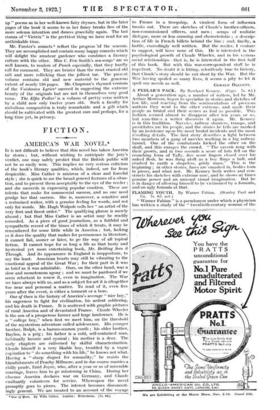POETS AND POETRY.
POEMS AND VERSES.*
A FINE craftsman working hand in hand with the sensitive observer of simple things has produced the small volume of poems by Camilla Doyle.' The countryside is her commonest inspiration, and she has a range of moods which, though they fall short of the heights of grandeur and palpitating beauty, is her own discovery and has in it the thrill of a personal joy. This fresh note sounds, for instance, in the piece about the young rabbit :— " All day this spring—the first he's known— He lets himself be sideways blown
When the wind comes; he'll leap and Flounce, And try to rush two ways at once. . . ."
There the slight disparity of rhyme between the last two lines is most pleasing to the ear. Here is another observation from "The Prettiest Things," which shows her ability to catch a glimpse of beauty in the least likely place :—
"As where the lorries drop bright oil Weed-shaped, to turn our highways' soil As lovely as the ocean-bed. . . ."
The "Hymn to Saint Lucy" has the silvery tone most fitting an invocation to the saint whose feast falls on the short-lived December day. Colour, though, is not by any means absent from Miss Doyle's verse, and the brightly-painted barges and bright-clad barge-girls of our canals decorate some of her -happiest pieces. Quite a different phase of thought is shown in the poem, "On a Crucifix thrown in a Stream," and its ambition is justified by its profound feeling and grave harmony.
The best of craftsmen have their weak places, and though Miss Doyle is nearly always keen in the finishing of her verse, we find several instances of an inadequacy in the rhyme, par-
ticularly in that of couplets, where, of course, it is most noticeable. The House of Hope2 will echo the inmost senti-
ments of many who suffered bereavement in the War. The verses are full of a traditional loveliness which is none the less moving for being familia?, like :— "The slow homecomings through October haze." The volume has been produced with unusual care, and the woodcuts by Phyllis Garden really enhance the pOignancy of the verse. It concludes with a lengthy allegorical poem, "The Journey of Women," which ends with a vision of hope :—
" Beyond the hills, beyond the hidden stars
Breaks somewhere now the morning of our world."
Miss Fyleman3 is not in general so successful in these " grown- • (1) Poems. By Camilla Doyle. Oxford: Blackwell. [Ss. 6d. net.]—(2) The House of lope. By M. W. Cannan. London : Milford. (4s. 6d. net.] (3) A Small Cruse. By Rose Fyleman. London : Methuen. [48. 6d. net.] (4) A Devonshire Garden. By It. IL Forster. London : Cape. [2s. 6d. net.]— (5) Sea Songs and Ballads. By C. Fox Smith. London : Methuen. [6s. neta- (8) Vaishnava Lyrics. Translated by J. A. Chapman. London : Milford. (4s. Od. net.] —(7) The Elfin Pedlar. By Helen Douglas Adam. London ; Hodder and Stoughton. [7s. 6d. net.]
up" poems as in her well-known-fairy rhymes, but in the later pages of the book it seems to us her fancy breaks free of the more solemn intention and dances gracefully again. The last stanza of " Victrix" is the prettiest thing we have read for an unthinkable time.
Mr. Forster's sonnets 4 reflect. the progress of the seasons. They are accomplished and contain many happy conceits which will delight the amateur gardener who combines a literary culture with the other. Miss C. Fox Smith's sea-songs' are so well known, to readers of Punch especially, that they hardly call for comment. They are brinier than the most crusted old salt and more rollicking than the jolliest tar. The present volume contains old and new material to the generous extent of nearly 150 pages. Mr. Chapman's rhymed versions of the Vaishnava Lyrics, succeed in suggesting the extreme beauty of the originals but are not in themselves very good verse. The Elfin Pedlar% is a volume of pretty verse written by a child now only twelve years old. Such a faculty for melodious composition is truly remarkable and a gift which should be cultivated with the greatest care and perhaps, for a long time yet, in privacy.



























































 Previous page
Previous page